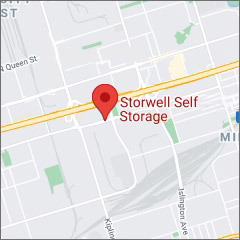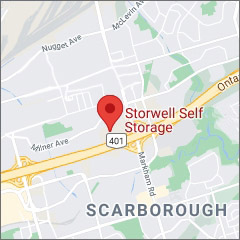A place for everything, and everything in its place.
A Totally-Not-Boring Blog About Storage
Tips and Tricks for Storing Vinyl Records
Table of Contents
- Store your records in a cool dry place
- Vinyl records must be stored in an upright position
- Short-term vinyl record storage solutions
- Use shelves and dividers
- Cleaning your vinyl records
- Using a self-storage unit for long-term vinyl record storage
- Vinyl record storage at Storwell
- FAQs
- Can I stack my vinyl records on top of each other?
- What is the best temperature for storing vinyl records?
- How can dust affect vinyl records?
- Can I clean my records with soap and water?
- Where can I find self-storage for my vinyl records?
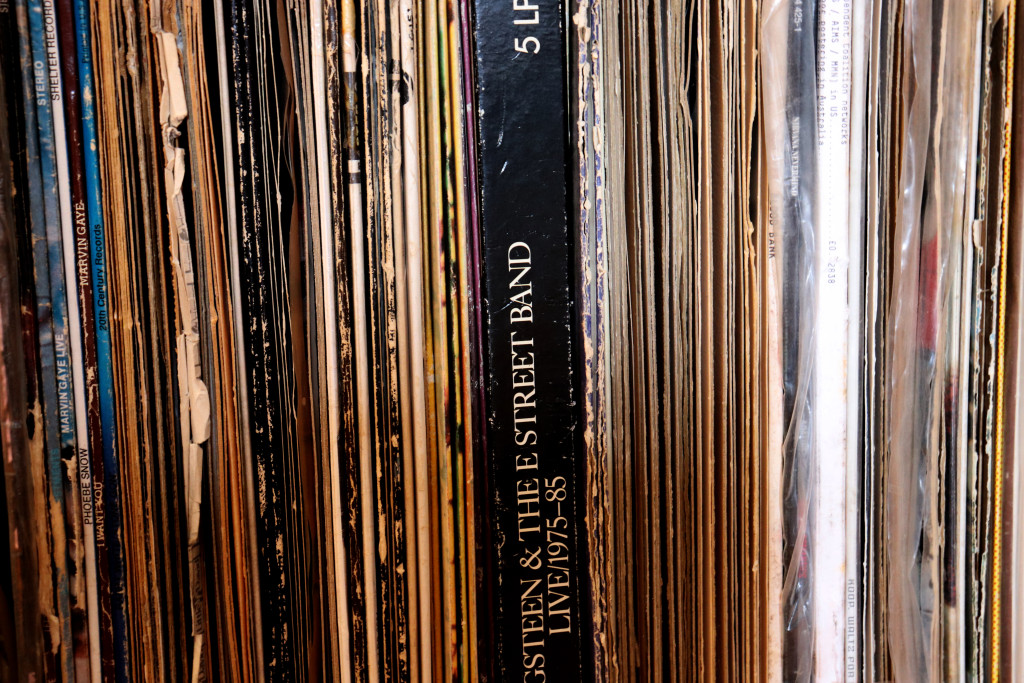
In recent years, vinyl has made a tremendous comeback with many major artists from Taylor Swift to Kendrick Lamar releasing their latest albums on vinyl. With vinyl records getting more and more popular is it becoming increasingly important that you understand the importance of preserving your records. Vinyl records must be treated with care, as they are very fragile and can be easily damaged. Records that are scratched, scuffed or bent can result in skips in the music, or worse, not play at all.
The way you store your vinyl records can have a drastic impact on the longevity of your albums. If you’ve ever purchased records from a garage or yard sale that have been sitting in an attic for decades, you know exactly how important proper storage is for vinyl records. The environment, temperature, humidity, and other factors all contribute to the health and condition of your LPs. If you live in the GTA, renting a self-storage unit in Etobicoke for your vinyl record storage is one of the best ways to ensure that your records stay in great condition. Here are some other useful tips and tricks on how to properly store vinyl records to preserve and protect them, no matter their age or condition.

Store your records in a cool dry place
The first and most important aspect to consider is the room temperature of the area. You want to store vinyl records in a cool place, not too cold, but not too hot. If the vinyl is exposed to high heat for extended periods of time, it can lead to warping and other damaging effects.
If you have a temperature-controlled attic or storage unit, that can be a great choice. However, most attics will get far hotter than the rest of the house. Cellars can be a good option, but you need to pay close attention to the moisture level in that area.
The second most important aspect to consider when it comes to storing your vinyl records is the humidity level. High humidity or moisture in the air can cause significant damage to your albums over time. In a normal home, a finished basement is usually ideal for storing vinyl, as it will remain cooler without getting as humid as a cellar might. If that isn’t an option, try to find a room in your house that will remain cool and typically have low humidity.
Excessive exposure to bright lights and direct sunlight can, over time, damage your records. This is especially true with ultraviolet light. In most cases, this won’t be an issue, but if you have a large window next to your records with UV lights, be careful not to store your records in view of the light.
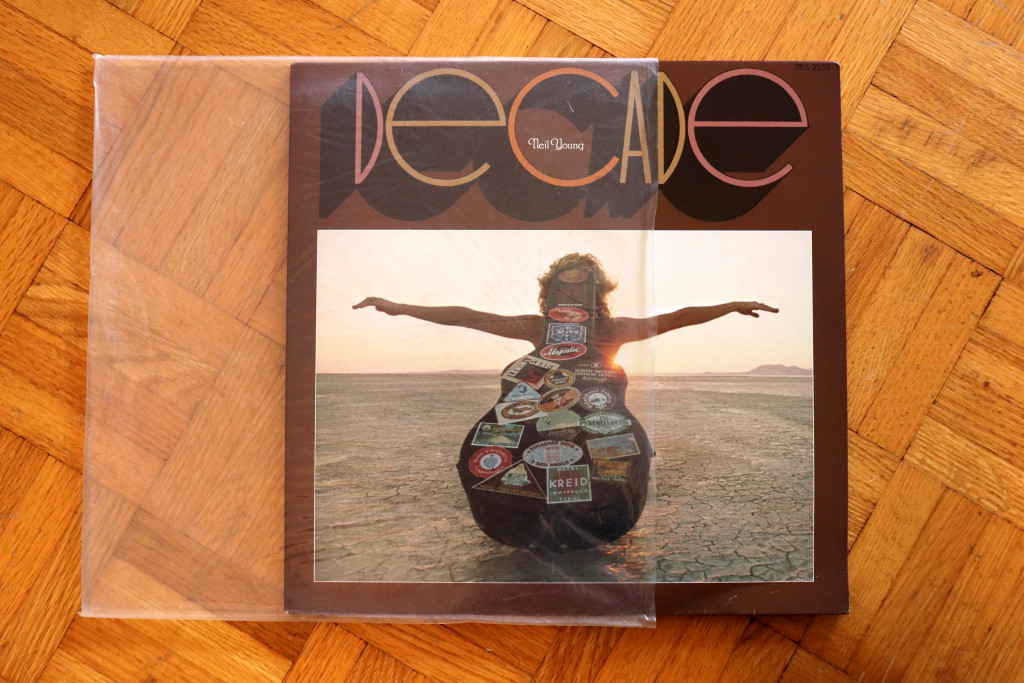
Vinyl records must be stored in an upright position
Vinyl records need to be stored in an upright position to ensure they stay in good condition. Records that have been stored at a slant for an extended period of time can warp because of the uneven pressure that has been placed on them. This is why records are often kept in crates that position them upright. Crate dividers make sure your records stay evenly upright with little or no slanting.
Stacking your record collection could permanently damage your records, whether they’re in their jackets or not. The weight will lead to warping of the vinyl and even possible cracking or scuff marks. You’re also putting the album jacket artwork at risk when you stack records in storage.
The most common mistake people make when storing vinyl records is not considering the pressure that is placed on them. A single 12-inch vinyl record typically weighs about 5 ounces. If you have 50 of these on a shelf, that’s between 15-20 pounds of pressure leaning on the last record in the line. This isn’t a problem for a minute or two, but after an extended period of time the intense pressure can cause warping, groove distortion, and other irreversible damages.
Short-term vinyl record storage solutions
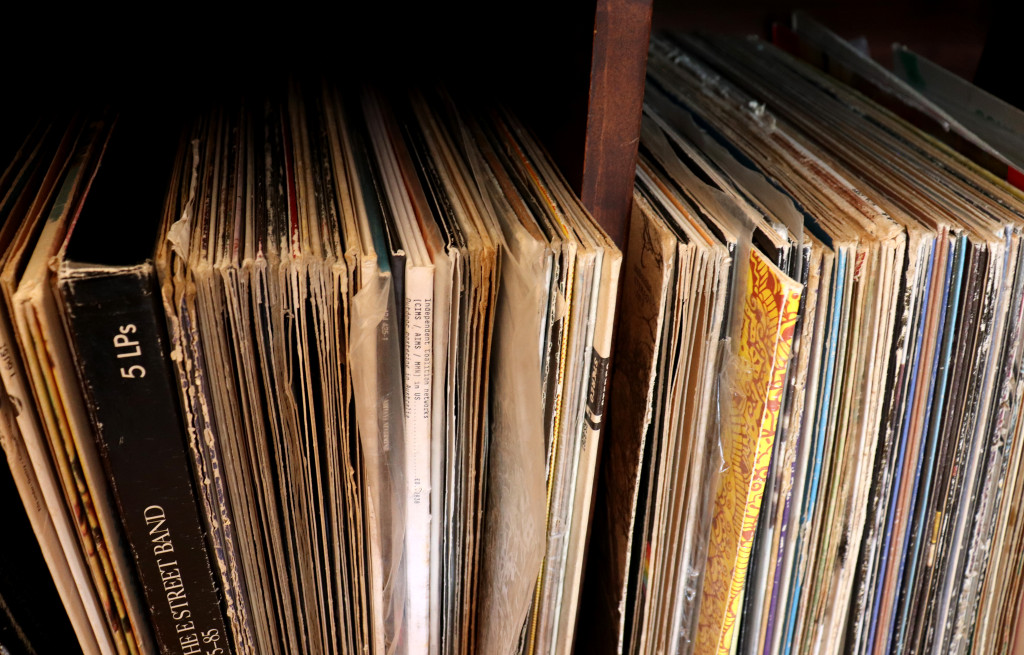
For records that you actively listen to, you will want to use a short-term storage solution. You can keep these on a shelf under your turntable and pull them out as you use them. These can be stored in a slightly warmer setting but you still want to make sure that the humidity levels don’t get too high. If a record is in consistent use you will need to clean them properly before and after each play using an anti-static record brush and record care solution.
Inner sleeves go between the vinyl and the cardboard cover. They are made of anti-static paper or plastic and help to keep dust from collecting on your vinyl. Most records will typically come with a paper inner sleeve, but the plastic ones are far superior. In fact, using paper sleeves can actually scratch your records over time. Invest in high-quality plastic inner sleeves if possible; they will also last much long than the paper sleeves that come with most vinyl records.
Outer sleeves are typically made from plastic and help to protect both the cardboard album cover and the vinyl inside. If you purchase old records from thrift stores or garage sales, the outer sleeves will most likely be missing. You can order replacement outer sleeves online.
The only time the record should be out of its jacket is when it’s being played. That means putting your a record away as soon as you are done listening to it. By leaving it on the turntable longer than necessary, you are allowing dust and dirt to accumulate on the records, which can then impact sound quality.
Use shelves and dividers
Due to the pressure problem, you want to avoid throwing all of your records into a bin if possible. As time goes on, they will continue to fall and push on themselves, potentially causing long-term damage. Instead, invest in some sort of shelving solution where you can keep sections of records separated. You don’t want to have more than about 15 records leaned on one another on a shelf, as more than that will lead to unwanted pressure. In order to lessen the amount of static, you can go with a wood shelf as opposed to a metal one. This will help to protect your records from static electricity and dust buildup.
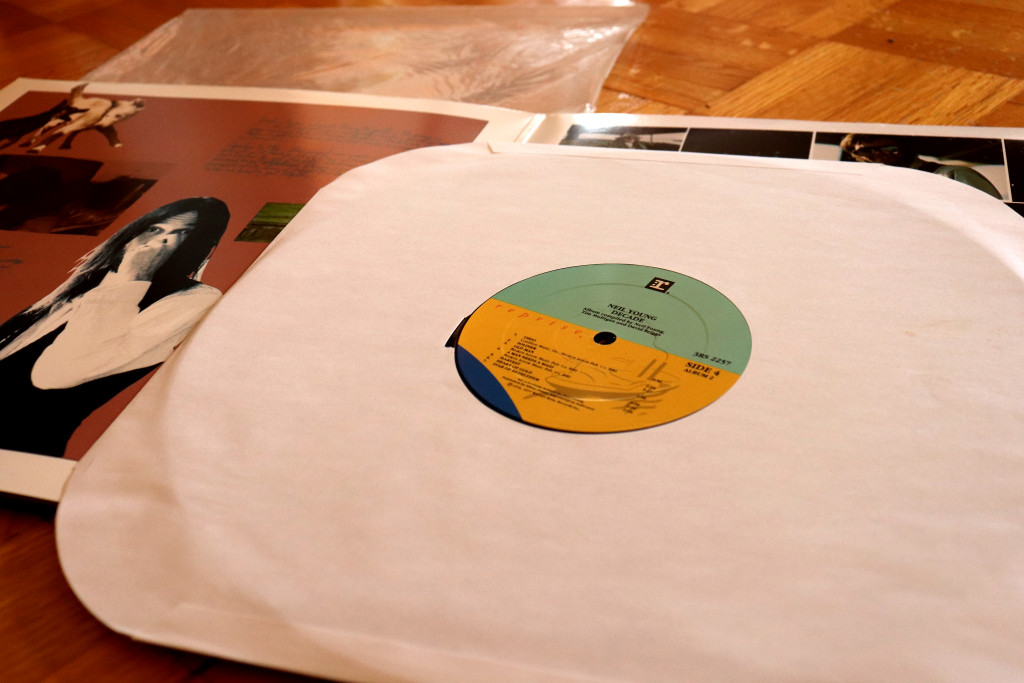
If you are unable to have a lot of shelves to separate your records with, make sure you have some strong, sturdy dividers. You just need some thick wood to place between your records to help support them.
Ideally, LPs should stand up straight on the shelf instead of leaning to one side. This will help to lessen the pressure placed on the end records. You can accomplish this by placing a divider every 4-6 inches. Dividers are also great for organizing your collection. You can label each divider by genre or use them to place your records in alphabetical order.
Cleaning your vinyl records
Be sure to thoroughly clean your vinyl records before placing them in short-term or long-term storage. If they are new records, be sure to brush them down with an anti-static brush to remove any dust or debris in the grooves. If dusts sits on a record for too long it can work its way too deep into the record to be removed. The next time you play the record, the stylus on your turntable will embed that dust even deeper into the vinyl. This is what leads to a lot of crackling and skipping on vinyl records.
If you collect records, you should have a record cleaning brush. These are inexpensive and very easy to use; you just hold the brush on the record while spinning it slowly. If you have a record that is in worse condition, you can purchase vinyl-cleaning solution. Simply spray the solution onto the record, avoiding the record label, and wipe with a microfiber cloth in a circular motion. Do this every six months to ensure your records continue looking and playing like brand new.
Using a self-storage unit for long-term vinyl record storage
Unfortunately, most people do not know how to properly store their vinyl collections for the long-term. If they are not going to be touched for a year or more, you will want to find a more permanent place to store them.
If you don’t have room in your home for your vinyl collection or you don’t plan on playing your records for a prolonged period of time, storing you vinyl records in a self-storage unit in a great solution. Extreme swings in temperature pose the biggest threat to your vinyl record collection. Moisture and humidity can also damage album covers and vinyl as well. Storing vinyl records in a storage space with poor ventilation during a hot summer day could the vinyl to warp or even melt.
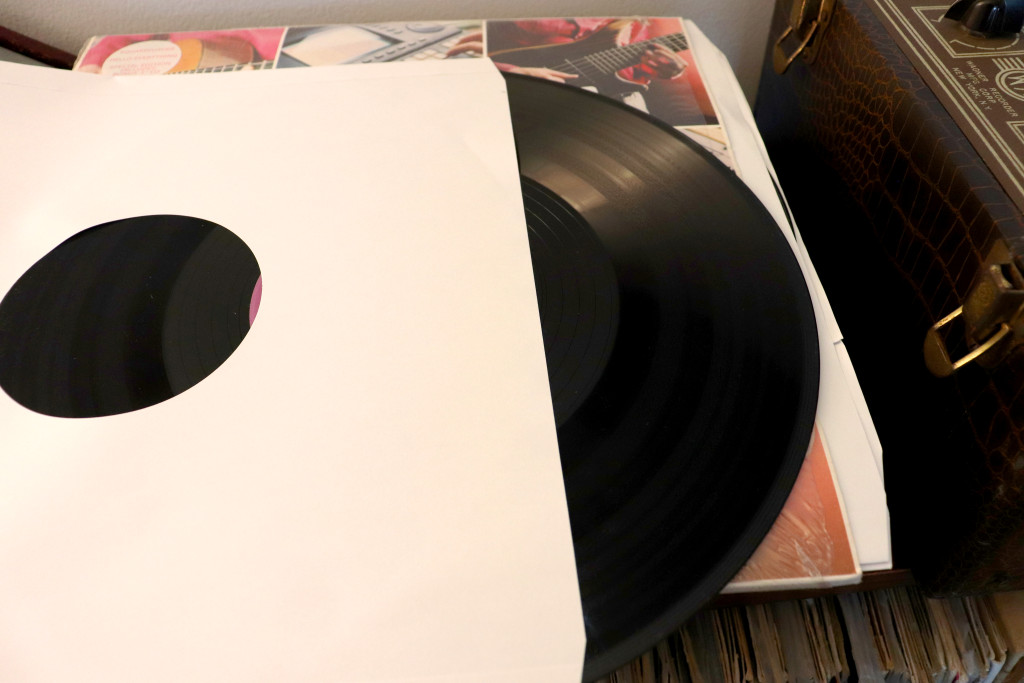
Proper ventilation and temperature control is necessary for long-term storage of your vinyl records. Look for storage units that have power ventilation that can regulate temperature and humidity to stay within a predictable range. That means your entire collection will be better protected from the threats of mold, mildew, and extreme heat.
Never stack boxes of records more than three high. Doing so can put too much pressure on discs in the bottom tier. Keep them off the floor if possible as well in case of flooding. Wood shipping pallets work well to keep your records off of the concrete floor of the storage unit. You can also set up your own shelving inside the storage unit to keep your vinyl collection secure and well organized.
Vinyl record storage at Storwell
The price of vintage vinyl records has skyrocketed over the last few years with the medium seeing a major resurgence in popularity. Certain vinyl collections can be worth thousands of dollars, which is why choosing a self-storage facility with the proper safety precautions is of the upmost importance when deciding where to store your vinyl records. Storwell Self Storage is a great option for vinyl storage; our facilities have state-of-the-art security features to ensure that our customers’ items are properly taken care of. Some of the security features include 24-hour video camera surveillance, pass code gate access, and individually alarmed units.
FAQs
Can I stack my vinyl records on top of each other?
One of the worst things you can do for your vinyl records is stack them up on top of each other. Stacking your record collection could permanently damage your records, whether they’re in their jackets or not. The weight will lead to warping of the vinyl and even possible cracking or scuff marks. You’re also putting the album jacket artwork at risk when you stack records in storage.
What is the best temperature for storing vinyl records?
Temperature is a very important factor to consider when storing vinyl records. If the vinyl is exposed to high heat for extended periods of time, it can lead to warping and other damaging effects. On the other hand, if the temperature is too low, the vinyl could possibly freeze and crack. The ideal temperature for storing vinyl is 65° to 70° F or 18 to 21° C.
How can dust affect vinyl records?
Dust buildup is unavoidable when you are dealing with vinyl records. You can mitigate the amount of dust that accumulates on your records by using dust jackets and practicing proper vinyl storage techniques but inevitably dust will still show up on your vinyl. If left unchecked, dust can cause real damage to both your stylus and records. Not only does it contribute to pops and crackles, but it can also lead to the needle jumping, and even stylus and record wear. It’s important to clean your records often using an anti-static brush for the best results.
Can I clean my records with soap and water?
You can use water to clean your vinyl records but it is not recommended. The mineral deposits and impurities that domestic tap water leave behind are a potential threat to delicate vinyl grooves. Ideally, you would use vinyl-cleaning solution to clean your records but if that is unavailable, you should always opt for distilled water.
Where can I find self-storage for my vinyl records?
Renting a self-storage unit is a great way to keep your vinyl records safe, clean, and in good condition for the next time you want to listen to them. Storwell Self Storage has premium self-storage facilities across the GTA in Scarborough near Markham Road and Highway 401, in Etobicoke near Kipling Avenue and the Gardiner Expressway, and in Mississauga near Winston Churchill Boulevard and the Queen Elizabeth Way.

